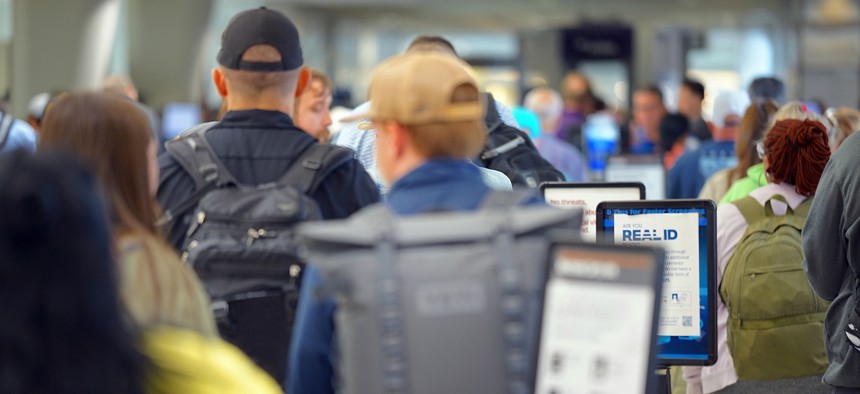What the REAL ID delay tells us about implementing proof-of-citizenship laws

Ark Photography via Getty Images
Twenty years into the program, millions of Americans still don’t have the right ID to board a plane. If similar dysfunction plays out in our elections, the stakes are much higher than a missed flight.
This article was originally published by Votebeat.
You know the REAL ID that you need to have if you want to board a plane? The deadline to get one was supposed to be May 7. But just days before that, the Department of Homeland Security hit pause, again. Twenty years after Congress passed the REAL ID Act, too many people still didn’t have the right kind of ID, so enforcement was delayed — as it has been multiple times.
It’s easy to see why. In states like Kentucky, residents seeking a REAL ID faced long lines, limited DMV appointments, and widespread confusion over which documents to bring. In Illinois, hundreds of complaints poured in from residents who were denied IDs despite having paperwork they thought would qualify. Some were turned away because of paperwork errors, others because staff misinterpreted the rules.
Meanwhile, nationwide, millions of Americans still lack a REAL ID, and once the law takes effect, they would face added hurdles if they wanted to travel by plane.
So what does this have to do with voting?
President Donald Trump’s recent executive order on elections called for requiring voters to show documentary proof of citizenship to register to vote in federal elections. It lists passports, birth certificates, and military IDs as acceptable forms of identification, but not much else. Meanwhile, the federal and state bills to require proof of citizenship all have slightly different versions of what would constitute acceptable documents.
Proponents of these laws describe them as a commonsense step, and a minimal burden, to ensure that only eligible voters cast ballots. But the REAL ID saga shows that a proof-of-citizenship requirement might not be such a simple step. And it’s not just voters who might have trouble with it.
For now, a federal judge has blocked the proof-of-citizenship provision in Trump’s executive order amid a volley of legal challenges. In one of those cases, a parade of Democratic state election officials made clear that enforcing such a requirement is not just difficult, but unworkable.
In Michigan, most residents don’t have a passport, military ID, or a REAL ID that indicates citizenship, Elections Director Jonathan Brater said in a declaration filed in federal court. Getting those documents, he noted, “would require time, travel, and in many cases significant fees.” His team would have to rewrite manuals, retrain staff, and launch a $2.5 million education campaign just to get voters up to speed.
In Nevada, Deputy Secretary of State Mark Wlaschin told the court that he had to drop critical pre-election tasks to start mapping out how election officials would comply with the executive order. “Those are days and hours that I was unable to spend on other office priorities ... time that my staff and I cannot get back,” he said.
Donna Barber, New Jersey’s election director, warned that pulling staff to implement the order “would directly harm New Jersey,” especially as her team prepares for two statewide elections this year. She added that losing federal election funds — as the executive order threatens for noncompliance — could cripple local governments’ ability to run elections, including ensuring access to polling places for voters with disabilities.
Arizona Secretary of State Adrian Fontes pointed out that the documents cited in Trump’s order don’t align with Arizona’s existing state laws requiring proof of citizenship to vote in state and local elections. That would mean rewriting state forms and creating a new set of different processes for state and federal voters — a recipe for voter confusion. He estimated that the education campaign alone would cost over $1 million before the 2026 elections.
Massachusetts’ election team is already racing to implement a new statewide voter registration system that complies with expanded vote-by-mail laws. Michelle Tassinari, first deputy secretary of the commonwealth, said that diverting time and tech resources to implementing the executive order could derail that plan. Just updating online forms would take six months, and overhauling the entire database would take much longer. And the state hasn’t budgeted for the $750,000 public outreach needed to explain it all.
REAL ID’s rocky rollout has already left travelers confused and frustrated, and it still hasn’t been fully implemented. But if similar dysfunction plays out in our elections, the stakes are much higher than a missed flight. State officials are warning that voter registration tied to documentary proof of citizenship could create massive delays, confusion, and voter disenfranchisement, and they’re not equipped to carry it out.
Expecting underfunded, understaffed state election offices to roll out something so complex nationwide on a tight timeline is unrealistic.
Government is a big ship. Turning it takes time, money, and substantial political will. And even then, success depends on the willing cooperation of tens of millions of Americans who are busy with other things.
So the next time someone insists this kind of policy shift will be simple, tell them the truth: It’s not. It’s expensive. There will inevitably be mistakes and delays, even if the courts allow the policy to move forward. And amid that turmoil, people’s right to vote will be at stake.
We’ll keep watching how this debate plays out in court and on the ground, and keep talking to the people who would be responsible for making these rules work.
Jessica Huseman is Votebeat’s editorial director and is based in Dallas.





